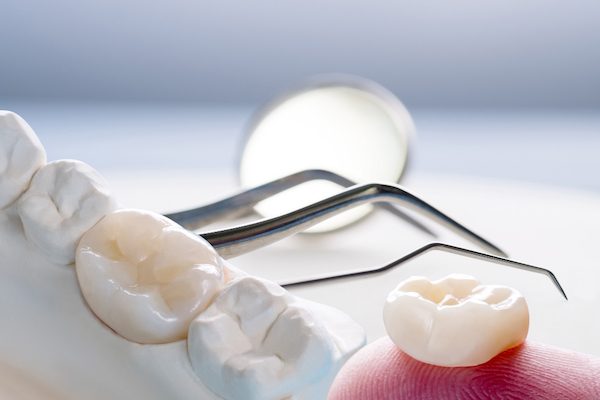Dental Crowns

Dental Crowns Thornton
A dental crown may be suitable for patients who need a tooth extraction, have a root canal, or do not like the look of a cracked tooth.
Cosmetic dental crowns are designed to mimic natural teeth in colour, shape and bite. It will also blend with your other teeth in your mouth in terms of appearance, texture and even the mode of operation.
Your friends and even your close relatives are most unlikely to notice that you have a crown, as they will be impressed by the beauty of your smile instead.
What Are Crowns?
Crowns or caps are artificial covers for teeth with a root canal (very little of the natural crown of the tooth remains), damaged or fragile teeth, or teeth decayed beyond fillings. They are made from porcelain or ceramic material, and since they can be manufactured in different shades, they can be made to resemble the natural colour of the teeth. In most cases, it requires two appointments to place the crown.
At the initial visit, we shape the tooth to make the crown fit tightly over it as a glove. We then prepare an impression of the tooth so that the crown will fit in between the two adjacent teeth and the size and shape of the capped tooth. During this visit, we place a temporary crown on the tooth that will be used until the permanent crown is made.
We then fix the permanent crown during the second visit and check whether it is comfortable and that your bite is correct. That’s it!
Dental crowns can be constructed from a range of materials. Your dentist will discuss the material most appropriate for your situation. The cost of dental crowns does vary depending on the type of crown required. Your dentist can provide you with a fee estimate before completing any treatment.
Who May Need A Crown
Reasons your tooth may be compromised and require a crown include:
- Dental injury resulting in a cracked or chipped tooth
- Cosmetic imperfections of a tooth
- A tooth that’s had root canal treatment
- A tooth weakened due to decay, clenching or grinding
A dental crown may also cover a discoloured tooth, provided it is the best option. A crown can be made from several materials: metal, porcelain, ceramic, resin or a mixture of these. Thornton, Maitland NSW dentist will discuss these options to help you decide which type is best based on several factors, including longevity, appearance and cost. Crowns can give your teeth their original function, and your smile will return its confidence!
Dental Crowns in Thornton
Thornton Dental takes pride in offering advanced designs and the finest materials in dental replacements. Our experience in providing dental crowns allows us to give you the finest dental service possible. If you are ready to restore your smile with our crowns, visit us today.
Call us at (02) 4966 2996 to book your appointment online today!
Risks arise from every invasive or surgical operation. Before taking further action, it would help to get a second opinion from a medical practitioner regarding proper licensing.
Visit us at Thornton Shopping Centre, Shop 30/1 Taylor Ave in Thornton.
FAQs
What is a dental crown?
A dental crown is placed over an affected or decayed tooth to regain its shape, size, strength, and appearance.
Why might I need a dental crown?
Crowns protect weak teeth, restore broken teeth, cover large fillings, support dental bridges, or cover discoloured or misshapen teeth.
What are dental crowns made of?
Dental crowns can be created from porcelain, ceramic, metal, resin, or a mix of these materials.
How long do dental crowns last?
Dental crowns may last up to 15 years or more if properly managed.
Is the procedure painful?
The procedure is usually not painful due to local anaesthesia. However, some discomfort may occur after the anaesthesia wears off.
How do I care for my dental crown?
Avoid biting hard food or using your teeth as tools, and practise good dental hygiene by brushing and flossing daily.
Can a crowned tooth get a cavity?
If adequate dental hygiene is not maintained, cavities may still develop in the tooth beneath the crown.
What is the process for getting a dental crown?
The process usually involves two visits: one to prepare the tooth and take impressions and another to place the permanent crown.
Are there any risks or complications?
Possible risks include sensitivity, discomfort, or the crown becoming loose or falling off. Rarely can an allergic reaction to the crown material occur.
